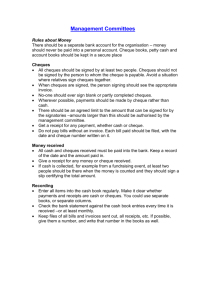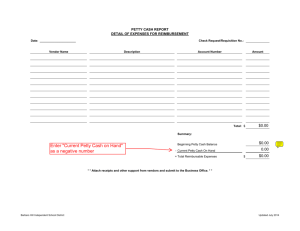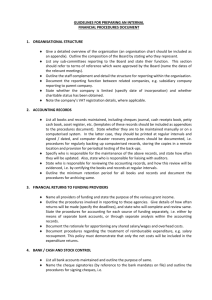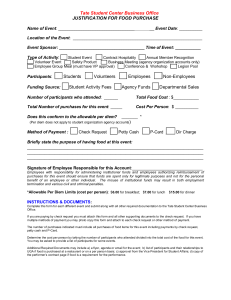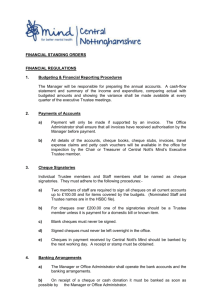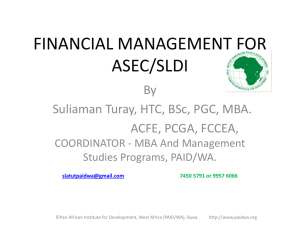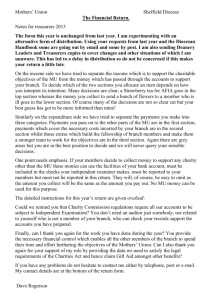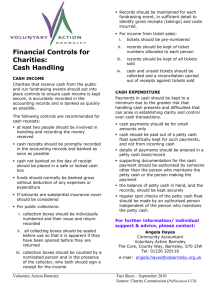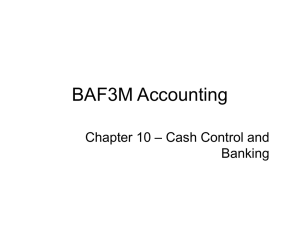FINANCIAL MANAGEMENT PROCEDURE
advertisement
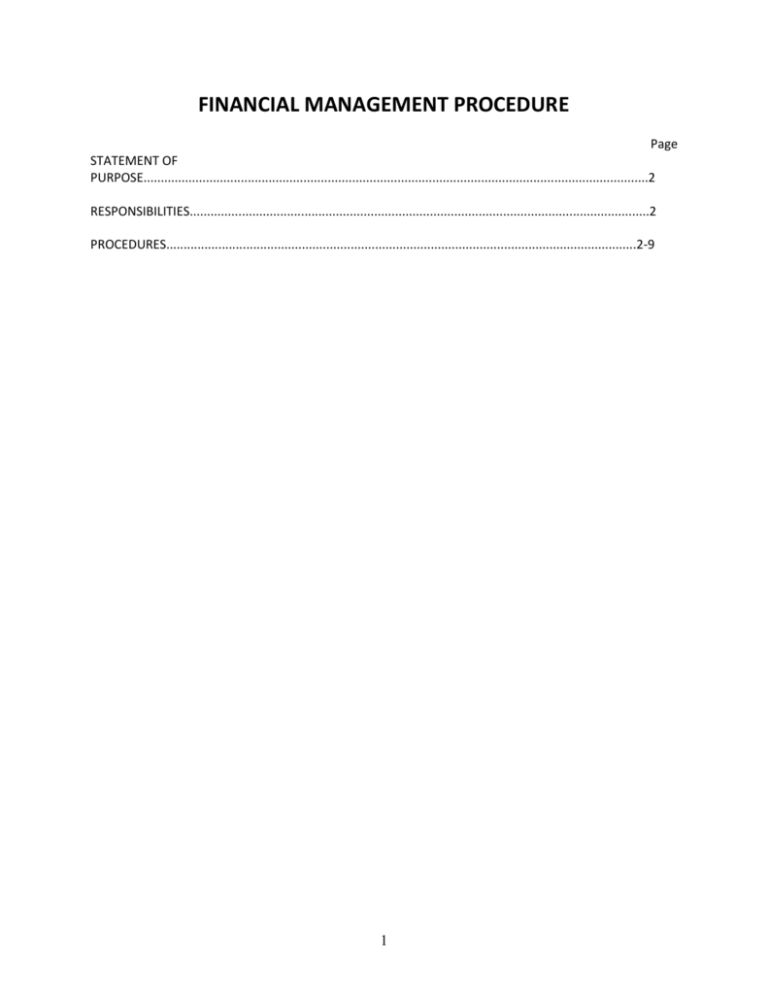
FINANCIAL MANAGEMENT PROCEDURE Page STATEMENT OF PURPOSE.................................................................................................................................................2 RESPONSIBILITIES....................................................................................................................................2 PROCEDURES.......................................................................................................................................2-9 1 1. STATEMENT OF PURPOSE 1.1 This document outlines procedures to be used in all areas of financial management within HAVS. It has been designed to provide guidance and information that will serve as a basis for financial accountability, compliance, sound business practices and effective financial decisions at the organisation. 2. RESPONSIBILITIES 2.1 The overall responsibility for managing the financial affairs of HAVS lies with the Trustees. 2.2 Company and Charity Law require the Trustees to prepare financial statements for each financial year. Under that law the Trustees elect to prepare the financial statements in accordance with United Kingdom Generally Accepted Accounting Practice (United Kingdom Accounting Standards and applicable law). The financial statements are required by law to give a true and fair view of the state of affairs of the charitable company and of its incoming resources and application of resources, including its income and expenditure, for that period. In preparing these financial statements, the Trustees are required to: 2.2.1 2.2.2 2.2.3 select suitable accounting policies and apply them consistently; make judgements and estimates that are reasonable and prudent; state whether UK Accounting standards have been followed, subject to any material departures disclosed and explained in the financial statements; 2.2.4 prepare the financial statements on an on going concern basis. 2.3 The Trustees are responsible for keeping proper accounting records which disclose with reasonable accuracy at any time the financial position of the charitable company and to enable them to ensure that the financial statements comply with the Companies Act 2006. They are also responsible for safeguarding the assets of the charitable company and hence for taking reasonable steps for the prevention and detection of fraud and other irregularities. In exercising these responsibilities, the Trustees have delegated certain tasks to the Finance Officer - specific responsibilities as set out in the Job Description. 2 3. PROCEDURES CONTROLS OVER INCOME 3.1 POSTAL RECEIPTS It is important to take all possible action to bring all funds sent to the charity by post into its control as soon as possible. 3.2 Incoming post to be opened at the earliest opportunity by the reception staff. 3.3 All incoming cheques to be logged in the cheque tracker immediately. 3.4 Cheques logged in the Cheque Tracker should be given to the Finance Officer. 3.5 Cash payments should not be accepted by reception staff. Clients wishing to pay by cash (to be actively discouraged) should contact the Finance Officer who will issue a receipt for such payment(s). 3.6 The security of unopened mail to be ensured. 4. BANKING AND CUSTODY Care always needs to be taken to ensure that, once funds are received into the control of the charity, their continued security is maintained. The steps listed below will provide a basic level of protection for the charity’s funds, but additional controls may be necessary depending on the individual circumstances of the charity. 4.1 Incoming receipts are banked regularly and as soon as possible – at least weekly (where practicable). Frequency of banking will depend on the amount of cash received. Keeping cash in a locked cash box is really only suitable for small amounts of money, i.e. less than £100. 4.2 Cash or cheques are placed in a safe or locked cash box until they banked. The keys to any safe or cash box should be held by a nominated officer. 4.3 All incoming monies are banked gross – no amounts be held back for "feeding" petty cash. 4.4 It is important that the money of the charity is kept quite separate from any individual’s personal money. For example, the nominated officer responsible for banking should not use their own bank accounts for the charity’s finances. The Trustees should make regular checks to ensure that records are being accurately maintained (so that money and other assets received can be traced through the accounting system), and that there are no discrepancies in the accounting records. 3 4.5 Records of cash and cheques received agree with bank paying-in slips. 4.6 The paying-in slips agree with the bank statements, in terms of amount banked. 4.7 All transfers or other direct payments into the bank can be identified and verified against supporting documents. 4.8 Bank reconciliation statements are reviewed by the Chief Executive Officer within 10 days of preparation. Monitoring should be made by someone other than the person concerned with the original recording of the transactions. CONTROLS OVER EXPENDITURE 5. PAYMENTS It is important for Trustees to bear in mind that they are responsible for all expenditure of charitable funds and have to account for how the charity’s funds have been applied. The basic rules of proper record-keeping, segregation of duties, and safekeeping of valuables are all vital. When making payments, it is recommended that the following rules are followed: 5.1 All expenditure and investment of charitable funds are properly authorised by the Project/Line Manager and it is essential that there are supporting documentation (e.g. itemised receipt, or invoice) for all items of expenditure. 5.2 Instruments of payment (such as cheque book, or credit card) to be kept in safe custody, with access limited to nominated persons -the Finance Officer or Office Manager. 5.3 The preparation of documentation for authorisation by appropriate signatories to be undertaken by the Finance Officer. 5.4 Ensure all cheques are signed by two authorised signatories. 6. PAYMENTS BY CHEQUE The basic controls listed below (though not exhaustive) are recommended in order to prevent any misuse of charity funds. If any particular control is delegated to employees the Trustees still have the overall responsibility. 6.1 The organisation’s bank mandate specifies who are the people authorised to sign cheques. 6.2 It is always advisable to have a "pool" of people authorised to sign cheques which is greater in number than the minimum number of signatures required on the mandate. 4 This can prevent a situation arising where insufficient signatories are available, e.g. during popular holiday periods. The controls below are recommended. 6.3 Cheque(s) made out to a nominated signatory should not be signed by that person. 6.4 No cheque(s) should be signed without a corresponding supporting document(s) attached to the cheque requisition form. 6.5 All supporting documents detailing the nature of the expenditure and beneficiary should be approved for payment by Project/Line Manager. 6.6 No blank cheques are to be signed in advance. In exceptional circumstances where this may be necessary, there must be sufficient audit trail of documentary evidence to support this. 6.7 All cheque expenditure must be recorded in the cash book or appropriate computerised accounting system. The cash book or computerised accounting system should record details of the cheque payment i.e. cheque number, payee, amount, date and a brief reference of the nature of the expenditure. All cheque stubs (or equivalent) must be completed at the time cheque preparation and retained. (It forms part of the accounting records). 6.8 Unused cheque book(s) should be secured. 7. PAYMENT BY PETTY CASH Every effort should be made to reduce the need for cash payments to an absolute minimum. 7.1 All cash payments will be made from a Petty Cash Float of a fixed amount which is regularly reimbursed from the bank account and not by the retention of physical cash receipts 7.2 All re-imbursement of the Petty Cash Float should be backed up by supporting documents. 7.3 The supporting documents must be authorised by someone other than the officer responsible for maintaining the Petty Cash Float. Petty cash claims must be signed by beneficiaries. 7.4 The organisation operates an imprest system. Petty cash re-imbursements shall be £100.00 (One Hundred Pounds). 7.5 Maximum petty cash claims will be limited to £10.00 (Ten Pounds). In certain circumstances a claim of £15.00 (Fifteen Pounds) can be made. All claims must be 5 supported by receipts. Where receipts are unobtainable, the claim should be verified by the appropriate Project/Line Manager. 7.6 Regular spot checks of the petty cash float should be made by an authorised person independent of the Officer responsible for keeping the petty cash. This involves the counting of physical cash in hand and reconciling this to the balance of the cash float and vouchers paid out. 7.7 Petty cash withdrawals shall be by means of the organisation’s ATM card. The card shall be secured by the Office Manager. The Finance Officer shall be responsible for withdrawals. 7.8 The petty cash till should always be secured. 8. CONTROLS OVER PURCHASES Trustees have a responsibility to ensure that adequate checks are made to both confirm that purchases have been properly authorised, and that goods or services ordered have actually been received. It is recommended that the following controls are in place (and are operated). 8.1 Project/Line Managers shall be responsible for authorising purchases for their projects/departments. (Approval for all purchases to be granted by the Chief Executive Officer). 8.2 Invoices received should be checked against orders made. 8.3 The quality and quantity of goods supplied should be inspected in order to ensure that they correspond with the orders placed and invoiced for. Services provided should be similarly checked. 8.4 Where stocks are kept, stock-taking should be conducted annually. 8.5 Payment for all goods and services should only be made against original invoices (or other electronic documents). 9. CREDIT CARD PURCHASES. Where the organisation has a credit card these basic controls should be maintained. 9.1 The Office Manager shall be responsible for securing the card. 9.2 The Finance Officer shall be responsible for effecting purchases. 9.3 All credit card purchases require prior approval from the Chief Executive Officer. 6 9.4 Purchase controls as indicated in Section 6.1 should be followed with all credit card purchases. 10. FIXED ASSET PURCHASES. 10.1 Assets over £500.00 (Five Hundred Pounds). All fixed asset purchases over £500.00 to be treated as capital expenditure. 10.2 Assets under £500.00 (up to £499.99) to be treated as revenue expenditure. 10.3 All fixed asset purchases to be recorded in the Fixed Asset Register. This register will be administered to record all assets of HAVS. The register is updated by recording all new purchases and deleting all fully depreciated assets (which have been disposed of). Information detailed in the fixed asset register should be able to lead an independent party to determine the location of the asset on physical examination as well as information relating to date of purchase, cost of the asset, serial numbers or identification tags related to that asset. Where the asset is disposed of, the disposal value should be recorded in the Fixed Assets Register containing the date of disposal. 10.4 Where the Equipment/Furniture/Fixture is still in use after 4 years, the item should be re-valued. The amount may be set by a professional valuer, or be determined by the Chief Executive Officer or a person delegated to carry out the revaluation subject to the approval of the Management Committee of HAVS. COMPUTER/EQUIPMENT PURCHASES. 10.5 All computer/equipment purchases £500.00 and above to be capitalised and written off over a 4 year life on a straight line basis. This policy is applicable where the Project life time exceeds 4 years. 10.6 Where specific purchases are reimbursed by the Funder, the asset should be written off in the year of purchase as a fully depreciated item in the Project’s Income and Expenditure Account (if the Project runs for One Year of less). Where the Project runs for a specific period, (Up to 3 years) Depreciation should be based on the life time of the Project. 10.7 Where the computer/equipment is still in use after 4 years, the item should be re-valued. The amount may be set by a professional valuer, or be determined by the Director or any other officer delegated for that purpose subject to the approval of the Management Committee of HAVS. FURNITURE AND FIXTURES PURCHASES. 10.8 All Furniture/Fixtures purchases £500.00 and above to be capitalised and written off over a 4 year life on a straight line basis. This policy is applicable where the Project life time exceeds 4 years. 7 10.9 Where specific purchases are reimbursed by the funder, the asset should be written off in the year of purchase as a fully depreciated item in the Project’s Income and Expenditure Account (if the Project runs for One Year of less). Where the Project runs for a specific period, (Up to 3 years) Depreciation should be based on the life time of the project. 10.10 Controls as specified in Section 6.1 are to be followed in all fixed asset purchases. 10.11 Where the furniture or fixture is still in use after 4 years, the item may be re-valued. The amount may be set by a professional valuer, or be determined by the Chief Executive Officer or any other officer delegated for that purpose subject to the approval of the Management Committee of HAVS. 11. CURRENT ASSETS/LIABILITIES. 11.1 Debtors/Creditors to be created at Year end. A Schedule of Debtors to be created by listing all invoices issued to clients that remain outstanding at year end. The Schedule of Creditors to be created by listing all invoices received from suppliers during the year and which are unpaid at year end and also for all invoices relating to the previous year which are received and or paid in the new financial year. 11.2 All invoices issued to clients must be checked regularly to ensure payments have been received. Reminders for payments should be sent out if payments are not made within the stipulated time. 11.3 Where goods or services are paid for in advance, a schedule should be maintained, detailing what proportion is to be treated as a prepayment. 12. CASH AT BANK AND PETTY CASH. 12.1 Cash at Bank: All monies received (cheques and cash should be receipted for). This to be done in a pre numbered or manually numbered receipt book. 12.2 All monies received should be banked weekly (preferably on Friday). All bank lodgements should be made in the official HAVS pay-in -book issued by CAF Bank (or the Bank where HAVS maintains its current account). The Lodgement should be supported by an Income Report listing the name of the client and the amount received and the reason for the receipt in the appropriate column for cash or cheques. The total of cash and cheques should equal the total amount lodged at the bank. 12.3 Where monies received exceeds several thousands of pounds, this should be receipted for and banked immediately. 12.4 HAVS operates a Petty Cash Imprest System. Maximum amount for reimbursement shall be £100.00 (One Hundred Pounds). Maximum petty cash Payments will be limited to £10.00 (Ten Pounds). 8 12.5 All payments should be supported by receipts. Where receipts are unobtainable, claim for petty cash should be certified by Head of Department. In certain circumstances a total amount of £15.00 (Fifteen Pounds) may be paid out of petty cash. Petty cash will be maintained by the Office Manager. 13. PAYMENTS TO SUPPLIERS All payments to suppliers shall be by cheque or by BACS payment only. 13.1 All cheque requisitions should be supported by supplier’s invoice. The invoice should be certified by staff responsible for commissioning the goods or service. 14 GENERAL RUNNING COSTS Overhead expenditure expressly incurred by a Project shall be allocated to that Project. 14.1 General Overheads not specifically incurred by a Project shall be apportioned across projects. 14.2 Apportionment of Overheads will be on the basis of manpower per Project at the period of apportionment or such basis of apportionment as are appropriate taking into account the nature of the expenditure. 14.3 Where a charge can be specifically determined e.g. cost of mail outs, this would be chargeable to the Project incurring the costs. The remaining costs would then be apportioned on the basis of manpower across the Projects or by using an appropriated basis taking into account the nature of the expenditure. 14.4 In situations or circumstances where apportionment is to be made on the basis of percentages, the Chief Executive Officer shall determine appropriate percentages for allocation of overheads to be charged to Projects. (To be based on facts available at the period in time). 15. RESERVES POLICY Trustees have adopted a policy regarding reserves, which should ensure that the unrestricted free reserves will: 15.1 Provide for cash flow in the event of late payment of grants or other external funding 15.2 Provide for statutory redundancy payments to core staff if core funding is lost 15.3 Meet current liabilities in respect of rent and leasing agreements for six months in the event of withdrawal of core funding. 9 15.4 Provide for legal costs in the event of the charity being subject to legal action, in particular arising from employment matters. The policy requires that the charity holds three months of free reserves. The policy is reviewed annually. 10
